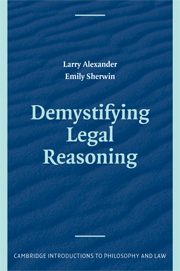Book contents
- Frontmatter
- Contents
- Introduction
- PART ONE Law and Its Function
- PART TWO Common-Law Reasoning: Deciding Cases When Prior Judicial Decisions Determine the Law
- PART THREE Reasoning from Canonical Legal Texts
- V Interpreting Statutes and Other Posited Rules
- VI Infelicities of the Intended Meaning of Canonical Texts and Norms Constraining Interpretation
- VII Nonintentionalist Interpretation
- VIII Is Constitutional Interpretation Different? Why It Isn't and Is
- Epilogue: All or Nothing
- Selected Bibliography
- Index
- References
VIII - Is Constitutional Interpretation Different? Why It Isn't and Is
Published online by Cambridge University Press: 05 June 2012
- Frontmatter
- Contents
- Introduction
- PART ONE Law and Its Function
- PART TWO Common-Law Reasoning: Deciding Cases When Prior Judicial Decisions Determine the Law
- PART THREE Reasoning from Canonical Legal Texts
- V Interpreting Statutes and Other Posited Rules
- VI Infelicities of the Intended Meaning of Canonical Texts and Norms Constraining Interpretation
- VII Nonintentionalist Interpretation
- VIII Is Constitutional Interpretation Different? Why It Isn't and Is
- Epilogue: All or Nothing
- Selected Bibliography
- Index
- References
Summary
To this point we have argued that the interpretation of canonical legal rules – whether those rules are promulgated by legislatures, administrators, or judges or by private parties engaged in private ordering through contracts, leases, wills, trusts, and the like – consists, or should consist, of attempting to discover the rule promulgator's intended meaning. Perhaps the search for the rule's intended meaning will be subject to evidentiary constraints in the interest of greater accuracy over the full array of cases, or the intended meaning will be subordinated to substantive or procedural policies embodied in legal norms of higher authority than the rule in question. But however so constrained, the quarry of interpretation of legal rules will be the intended meaning of their authors. And the skill required for legal interpretation – the “legal reasoning” that interpretation of canonical legal rules entails – is the same skill that all of us employ in trying to understand what others are requesting or demanding that we do.
In this brief chapter, we ask whether intentionalism of the sort we have described is the appropriate methodology for interpreting a constitution, the supreme law of the land. As readers no doubt are aware, intentionalism of the straightforward, unsophisticated type that we have been urging is nowhere as much disdained by legal theorists as in the domain of constitutional interpretation. Yet we maintain that intentionalism is as appropriate in constitutional interpretation as it is elsewhere.
- Type
- Chapter
- Information
- Demystifying Legal Reasoning , pp. 220 - 232Publisher: Cambridge University PressPrint publication year: 2008

